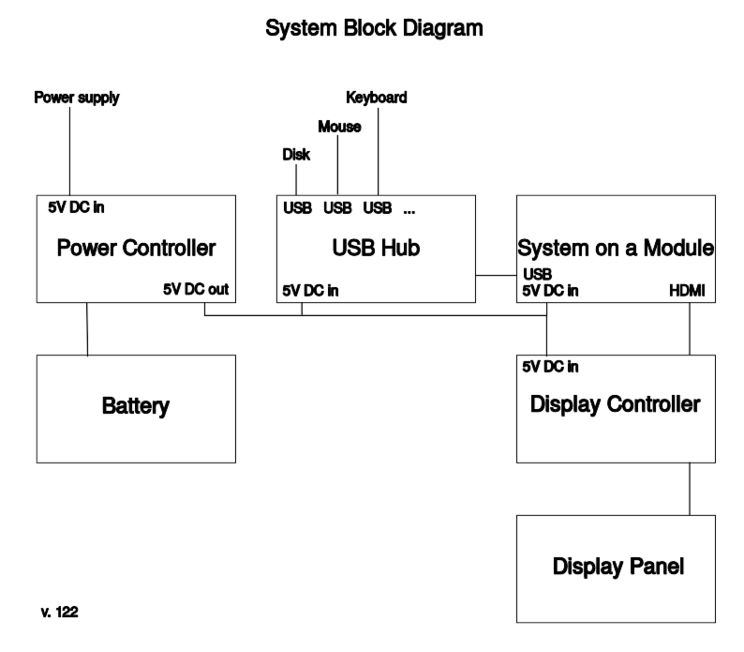Difference between revisions of "Specifications"
| Line 140: | Line 140: | ||
File:Batt.5V out.png|5V | File:Batt.5V out.png|5V | ||
File:Batt ch test12V.png|12V | File:Batt ch test12V.png|12V | ||
| + | </gallery> | ||
| + | |||
| + | ==OLED small screen for keyboard== | ||
| + | |||
| + | OLED Module: display OLED | ||
| + | |||
| + | 3.3÷5VDC | ||
| + | |||
| + | I2C | ||
| + | |||
| + | 33x20mm - 0.91" | ||
| + | |||
| + | <gallery> | ||
| + | File:Oled1.png | ||
</gallery> | </gallery> | ||
Revision as of 11:05, 22 September 2022
This page documents features from more engineering point of view. For a more user-centric point of view, see Features.
Major Balthazar parts are:
Power Controller and battery
These supply power to the rest of the system, particularly the System on a Module, USB Hub and Display subsytem. It also manages battery.
It should be capable enough to run some USB connected hardware.
See more: Power Supply
System on a Module (SoM)
This is the main system board, the computer. Boards from different makers should be supported.
Minimum of ports is required for wider compaitibility. These are: Power, USB and HDMI.
See more: System on a Module
I/O USB hub
IO-board basically means connectivity with peripheral devices. These can be seen as on-board and out-board. On-board devices include: keyboard + trackpad, webcam and optional audio-card. USB is the usual solution for this.
For more see our I/O USB page.
Unifying-PCB
Single PCB solution for connecting the three previously designed Balthazar modules (I/O, power supply, USB 2.0, 3.0 controllers, keyboard and adding Compute Module compatible FPGA boards. For more info see our Unifying-PCB page.
Display Controller and a screen panel
Provides interface to display panel by HDMI
Panel slim screen.
Resolution: 1920 x 1080
Aspect Ratio: 16:9
Pixel Pitch(mm): 0.1529 x 0.1529
PPI: 166
Active Area(mm): 294.06 x 165.54
Outline(mm): 299.96 x 186.92
Luminance(nits): 300
View Angle (U/D/R/L): 89/89/89/89
Contrast Ratio: 800:1
Support colour: 16.7M
Colour Depth: 8 bit
Colour Gamut (NTSC): 72%
Response Time(ms): 25
Power consumption: 3.7
Backlight: LED
Weight: 170 g
Frame Rate: (Hz)60Hz
Electrical Interface: DP 1.3
Ultra-slim thickness: 2mm
Case
Initial casing is meant to be made of a recyclable vegetable oil based plastic. Also the idea of a modular design gave us even more sustainable materials to look at - pressed used clothes in resin, cans recycled pressed aluminium and even resin-ed wood saw.
Here are elements we have been working with so far and slowly shaping the final design and a certain materials together.
On our Github page you can look into the .stl files too.
Chronological pictures and a phases of the development:
Keyboard and Touch-pad
See more: Keyboard
Battery
We did implementation and tests with this battery set:
Brand: Samsung
Battery size: 21700
Battery chemistry: Li-ion
Battery: Rechargeable
Voltage 3.6V
Min. capacity in mAh: 4,800.00
Battery version: Flat top
Discharge current: 9.60
Protection circuit: Unprotected
Height: 70.00
Diameter in mm: 21.00
Battery implementation and tests. Charging and operating.
OLED small screen for keyboard
OLED Module: display OLED
3.3÷5VDC
I2C
33x20mm - 0.91"
Software
Software depends on a System on a Module used.
See more: Software

















